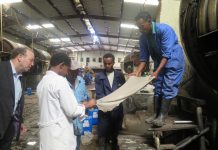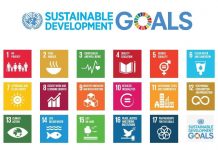As a person living in Africa, I am excited about how things are evolving on the continent. Over the last 20 years there has been continuing improvement in the governance environment and that sets the basis for most of the conversations we’re having today.
There’s a lot of work still ahead of us, but the key element is the continuing improving governance environment and, of course, the different regulations being placed in terms of stimulating behavior at the international level with multinationals.
You must appreciate the fact that the profits of a number of these multinationals are greater than the budgets of some of the African countries—most of the budgets, quite frankly—and the multinationals have the ability to bring together a whole slew of capacities that a country can’t even begin to even figure out.
Over the years we have heard a number of different stories concerning corruption and corruption on the continent and so forth. To narrow it down to the extractives, I think one of the things that we’ve seen is good leadership. Particularly in Liberia, we’ve had good leadership and that leadership has set the tone and the basis for how we have managed our behavior to a large extent. Part of my role as far as working for that leadership was in dealing with a lot of the different technical elements associated with managing that behavior and how we do business.
One critical thing, I’ve been involved in negotiating large natural-resource concession agreements there over the last three years, and over the last eight years I’ve been involved largely in designing or playing a part in designing the framework associated with that, from the president’s office, and engaging different elements of it.
From my own experience I’ve seen that a critical piece is understanding the value of the resources. A lot of times the different players along the value chain, for instance in the natural resource sector, really don’t even understand the full value of what they have. As a result of that, you can wind up negotiating a bad deal or agreeing to one. Someone can wave a few millions of dollars in your face, which, if you don’t appreciate the value of that asset that you have, can seem like a lot of money.
We have found that along the value chain, with respect to the whole negotiating of natural resource in extractives, is that the three major components are the preparatory, ‘the actual negotiations,’ and ‘the execution of those contracts.’ Some of the work that I’ve been doing with [Peter Eigen, Ph.D., founder and chairman of the Advisory Council of Transparency International and a co-author of the 2013 Africa Progress Report by the Africa Progress Panel] and others over the last several years is trying to bring more of that recognition to the table.
The ‘preparatory’ is very critical because it requires actually bringing together a broad corps of different expertise and skills to help the government fully evaluate the asset that it is going to negotiate. A lot of times the government hasn’t really fully thought through that because when you sit across the table going through negotiations, the multinationals, the kind of skills that the multinationals have on the other side of that table cover the gamut. And they’ve done their homework. They know exactly where that is going; they understand the markets and everything.
On the other end with the governments, a lot of times most of the government actors have no appreciation of the market, the dynamics of the market, and how all of that interplays. And so, we’ve been trying to look at a number of the different programs that are out there. We recognize that there are still some very major gaps with some of the work that we’re doing as far as addressing some of those gaps.
And, of course, there are the negotiations themselves.
The critical piece, though, is also the governance framework that the country itself has in place with respect to that particular sector. For instance, in Liberia we have a history of concessioning natural resources and the concessioning process requires that any agreement be eventually ratified by the legislature. As a result of that, it makes t his agreement that we’ve signed with this company law.
But it also takes it into the public domain, because once the agreement has been negotiated and agreed upon and signed by the respective ministers and so forth, before it is eventually signed by the president, it goes to the legislature, for which it becomes a public document and thus provides the opportunity then for a public debate—not just by the representatives of the people, but also by the people themselves in some of those communities that may have an opportunity to say, ‘here are some of our concerns with this agreement.’
Once it’s done and it’s ratified by the legislature and signed by the president then it becomes law for whatever the duration of that agreement, and it is a public document. This is why, with respect to our relationship with EITI [Extractive Industries Transparency Initiative), for instance, not only do we have the extractive and natural, but we also included forestry.
I think Liberia is the only country that also included the forestry sector as part of the whole EITI and reporting framework. You don’t find that situation in a number of countries and so it’s that governance environment that I think is quite useful.
On the multinational side, one can never say you can understand or give an explanation for bribery or corruption. This is why, for instance in the oil and gas business, that you have the frontier companies. The majors don’t come into certain environments until the wildcatters, so to speak, have come in.
In Liberia, Ghana, and some of those places, you see some of those smaller miners and companies come in. They have the flexibility to be able to navigate the difficult terrain that may exist. And once they’ve been able to acquire an asset, then you have the major players coming by.
It hasn’t been eradicated. It’s improving. It’s an ongoing improving environment and these kinds of initiatives and some of the initiatives we have on the table, I think, will continue to show that improvement.
To conclude, I think there are causal effects and also there are active results that are occurring because of the improving governance environment.
You have more and more Africans who had formerly lived outside of their countries returning home and those [Africans], because of the broadened appreciation and some of the zeal and the entrepreneurship spirits that they have, are beginning to engage the systems more. As a result, that is improving the process a bit more. That is also a positive development that is taking place.
Probably over the last ten years or so, statistics would show a significant number of expatriate Africans that have returned home. I know that in the West African region that number has been high. In Nigeria, Ghana, Sierra Leone, Liberia, and so forth, those numbers have been quite high. And what I am finding now, even in the Liberian situation, is that people who have lived in the U.S. for more than fifteen, even twenty, years are returning home and running for elective offices outside of the capital. That is also a phenomenon that is quite encouraging because, again, those people have a much broader perspective of things, they understand some of the issues a little bit more, they’re younger, and they have a little bit more zeal and that is continuing to engage and improve the environment.
So overall, yes, the challenges remain and this is why we continue to have to work in that respect. But I think it is a continuing improving environment.
The interesting thing, though, is, small businesses. Small and medium businesses out of the West, particularly out of the United States, are not looking at the opportunities sufficiently on the continent, quite frankly, and there is a significant amount of opportunity that they should be looking at. The different vehicles, the way to make that happen is still open to some discussion and review, but there’s a lot of opportunity that’s not being explored and experienced by a number of small businesses out of the United States and some of the other western countries.
O. Natty B. Davis is the senior public policy consultant at Devin Corporation and former chair of the National Investment Commission of Liberia. The above is a transcript of his formal remarks at a November 20 forum in New York City on “The Role of Ethics and Values in the Effective Management of Africa’s Extractive Industries.”













